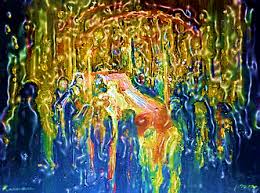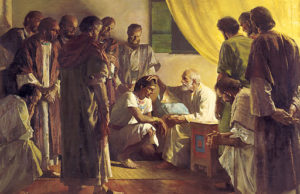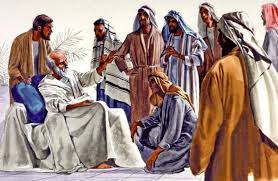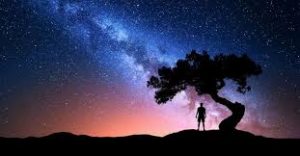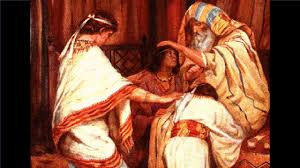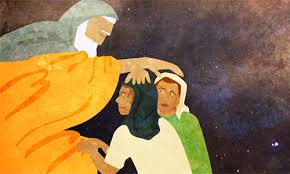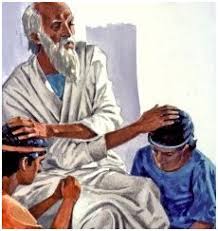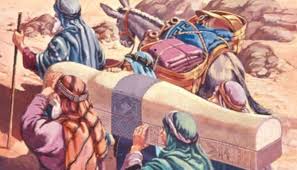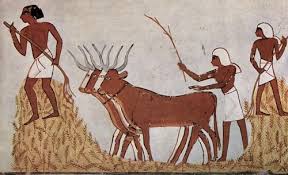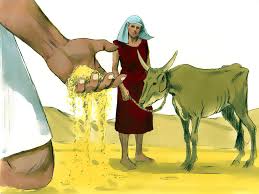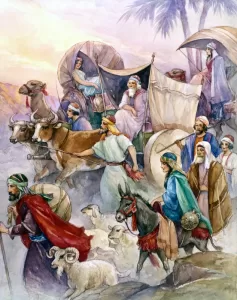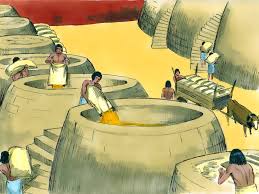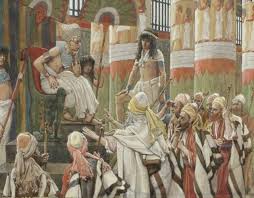Le – Reuben, You are Turbulent as the Waters, You Will No Longer Excel 49: 3-4
Reuben, You are My Firstborn,
Turbulent as the Waters,
You Will No Longer Excel
49: 3-4
Reuben, you are my firstborn, turbulent as the waters, you will no long excel DIG: How did Reuben disappoint his father Jacob? How was he like unstable water? What did Reuben give up? Who was his inheritance given to? Who was the priesthood given to? Who would be given the leadership of the tribes of Isra’el? What was the cause of Reuben’s curse? How did this show itself in his life and the life of the Reubenites after him? What hope did ADONAI give to Reuben?
REFLECT: There is a danger to instability, and we see this in Reuben. Morality and character go together. If we are morally unstable, we open ourselves up to sin. As believers, we are to be in control of our flesh and its appetites and desires. More importantly, we are to be steadfast in our faith and no longer be tossed back and forth by the waves, and blown here and there by every wind of teaching (Ephesians 4:14). How is your stability or instability affecting you and your family? What is the remedy for our disease of sin? What hope do you have in Christ?
Reuben, you are my firstborn, my might, the first sign of my strength, superior in vigor and power. Unstable as water, you will no longer excel. For you went up onto your father’s bed, onto my couch and defiled it (49:3-4).
Reuben, the eldest, naturally took his place closest to his father on the side of the bed. The name Reuben means, I see a son. Ya’akov looked up to him and said: You are my firstborn, literally, my chosen one, my might, the first sign of my strength, superior in vigor and power (49:3). The firstborn is often called the first sign of his father’s strength in the Scriptures (Deuteronomy 21:7; Psalm 78:51). He was supposed to be the leader of the twelve tribes of Jacob. Always wanting his father’s favor, yet realizing he had forfeited his right to it, Reuben was a pathetic person and son. Originally, he had a claim to the natural birthright of the firstborn son, which meant a double portion of the inheritance, the claim to the priesthood, and the leadership of the nation. Unfortunately, Reuben did not live up to his promise, or his father’s hopes.

In the near historical future, Reuben would be as turbulent, or as unstable as water. The Hebrew word for unstable is pahaz. It is from the root that describes the lawless mob of Judges 9:4 and the defiant prophets of Zephaniah 3:4. It suggests wildness as much as weakness. It is this aspect of water, so quickly becoming an undisciplined torrent, as pictured in Proverbs 17:14, which is the point of the comparison.763 He was passionate, but lacked self-control. Unfortunately, Reuben turned out to be weak and lustful.
As a result, instead of a blessing, he received a curse: you will no longer excel (NKJ). Reuben proved to be unstable, and as a result, lost his birthright to Joseph. Reuben . . . was born the firstborn, but when he defiled his father’s marriage bed, his rights as firstborn were given to the sons of Joseph son of Isra’el; so he could not be listed in the genealogical record in accordance with his birthright, and though Judah was the strongest of his brothers and a ruler came through him, the rights of the firstborn belonged to Joseph even though he was a much younger brother (First Chronicles 5:1-2). And we know from the Torah that Joseph went on to play a preeminent role in the history of the Jewish people. There were three privileges that the firstbornson would receive.
First privilege was the double-share of the inheritance. The husband was forbidden to follow his feelings and disregard the Torah. If a man has two wives, and he loves one but not the other, and both bear him sons but the firstborn is the son of the wife he does not love, when he will his property to his sons, he must not give the rights of the firstborn to the son of the wife he loves in preference to his actual firstborn, the son of the wife he does not love. He must acknowledge the son of his unloved wife as the firstborn by giving him a double share of all he has. That son is the first sign of his father’s strength. The right of the firstborn belongs to him (Deuteronomy 21:15-17).
The second privilege was the priesthood. In Exodus 12, the last terrible plague was the death of the firstborn (see my commentary on Exodus, to see link click Bt – At Midnight the LORD Struck Down all the Firstborn in Egypt). That’s because Pharaoh was taking all the sons of Isra’el (Exodus 1:15-16). And because of the redemption of Passover, ADONAI said in Exodus 13 that the firstborn of Isra’el are His priests. The firstborn was to be the priest of the family and this was to be Reuben. But in Numbers 8:5-26 we learn that because of rebellion of the other tribes in worshiping the golden calf, and Reuben’s sin with Bilhah, God set the Levites apart as the priestly tribe because they alone were faithful to Him.
The third privilege was being the leader of all the twelve tribes. He should have been superior in vigor and power. In other words, he would be the leader of all the tribes. They would all look up to him – the bekor (the first born). That was the plan, that was the promise, and that was the inheritance. Basically, Reuben should have had it made, but he failed. In fact, during the time of the Judges the tribe of Reuben did not come to the aide of Issachar (Judges 5:15-16). That exposed the basic problem of both Reuben himself, and eventually his descendants. His character flaws did not allow him to measure up to his lofty status as the firstborn son. Jacob’s sad prophecy for Reuben certainly came true. No judge, prophet, or king came from that tribe, nor any person of renown except Dathan and Abiram, who were infamous for their participation in Korah’s rebellion against Moses (Numbers 16:1-35).
As a result of his failure of character, Reuben’s leadership role would be given to the tribe of Judah. When Ya’akov got to Judah as he prophesied around his deathbed, Jacob would say to him,“The scepter will not depart from Judah, nor the ruler’s staff from between his feet” (49:10a). I am sure that prophesy was quite shocking to those sons gathered around their dying father, because that wasn’t the way it was originally supposed to be. To them Jacob was expected to say, “Reuben, you’ve got the scepter – you are leading the tribes.” But because of Reuben’s character flaws, he was implicitly told to step aside and hand that scepter to his brother Judah. You see, with Reuben, like unstable water, there was no telling where he was going to end up. It wasn’t merely the sin with Bilhah either, this was a pattern of behavior in his life.
And we can all relate to Reuben’s sin nature. Rabbi Sha’ul said it this way: For we know that the Torah is of the Spirit; but as for me, I am bound to the [sin] nature, sold to sin as a slave. I don’t understand my own behavior – I don’t do what I want to do; instead, I do the very thing I hate . . . for I know that there is nothing good housed inside me – that is, inside my [sin] nature. I can want what is good, but I can’t do it! For I don’t do the good I want; instead, the evil that I don’t want is what I do (Romans 7:14-19 CJB)! We all have a whole truck load of sin we would like to dump. It doesn’t take much effort to find sin in our own life (and way to often in the lives of others also). We sin – we confess it every day, every Shabbat, and every Yom Kippur (First John 1:8-10). We can’t put a band aide over the sin, we need to get at the root of the problem.
The good news for you and I is that God can fix our sin problem. But it is not easy to follow Yeshua. If it were easy everyone would be doing it. The TaNaKh teaches us not to despise ADONAI’s discipline or resent His reproof; for the LORD corrects those He loves like a father who delights in his child. For godly wisdom is a tree of life to those who grasp her and whoever holds fast to her will be made happy (Proverbs 3:11-18). We can’t go through our lives putting band aids over our sins. We don’t need self-help or self-realization – we need Yeshua-help and Meshiach-realization. Enough with us. The promise of the prophets was that we would have a new heart.
Like us, Reuben had his issues. Life isn’t easy. What does one do? We need to draw closer to Jesus who said: I AM the vine and you are the branches. If you remain in Me and I in you, you will bear much fruit; apart from Me you can do nothing (John 15:5). Adonai ELOHIM says: For I will take you from among the Gentile nations, gather you from all the countries, and return you to your own soil. Then I will sprinkle clean water on you, and you will be clean; I will cleanse you from all your uncleanness and from all your idols. I will give you a new heart and put a new Spirit inside you and cause you to live by My laws, respect My rulings and obey them. You will live in the Land I gave to your ancestors. You will be My people and I will be your God (Ezeki’el 36:24-28; also see Jeremiah 31:31-34).
When the nation of Isra’el came out of her forty years of wilderness wanderings, the Reubenites were the first tribe to ask for a place to settle, impulsively not waiting to cross the Jordan River with the other tribes (Numbers 32). This was a further indication of the loss of godly influence that the tribe of Reuben had on the nation. Therefore, when ADONAI would bring judgment against the nation of Isra’el, the Reubenites would be the first ones hit because they lived east of the Jordan River. Also, during later wars with the Canaanites, in the days of Deborah and Barak, the Reubenites failed to answer the call to arms (Judges 5:15-16). They participated in the erection of an unauthorized place of worship (Joshua 22:10-34).764 And thus, the Reubenites were overshadowed by Gad and overrun by Mo’ab (Second Kings 10: 32-33; First Chronicles 26:31-32).
We see something of the future of the Reubenites in the book of Numbers. In the first census, the tribe of Reuben was numbered at 46,500. But in the second census, the tribe had decreased to 43,730. The prayer of Moses in Deuteronomy 33:6 said: Let Reuben live and not die, nor his men be few. Consequently, Moshe had to intercede on behalf of the tribe of Reuben, so that they would not disappear. Although Reuben was the firstborn, the kingdom was given to Judah and the priesthood to Levi, leaving Reuben’s tribe to be small and non-influential.
Reuben’s sin was the reason for his curse: For you went up onto your father’s bed, onto my couch and defiled it (49:4). This whole verse is pretty emphatic (see Ik – Reuben Went In and Slept with His Father’s Concubine Bilhah). For instance, the last line switches to the third person as a point of emphasis. Jacob simply cannot believe what his eldest son did. Though Ya’akov had never said anything about it at the time, he never forgot it either. In 35:22, Reuben’s sin is explained as possibly challenging his father’s authority. It was a well-known and widely adopted practice in the ancient Near East that the eldest son should inherit the concubines of his father (Second Samuel 16:22). Reuben may have been asserting himself as the true heir of Jacob, but it backfired and his sexual violation became his lasting legacy.765 Here, Jacob was making it perfectly clear why Reuben lost his three privileges associated with the firstborn.
But it wasn’t all bad news for Reuben. Moses prophecies of a later promise for him and his descendants. The firstborn who forfeited so much, who should have been leading the charge, but was forfeited because of his sinful acts would still have hope. Moses prophesied one simple verse in Hebrew: Let Reuben live and not die, nor his people be few (Deuteronomy 33:6). The descendants of Reuben would still be around even though their forefather had issues. In fact, they would be walking with God in faith. What a blessing. The promise and the fulfillment.
Jacob’s prophecy of Reuben continued to be fulfilled, and because of their instability, the Reubenites faded without making any significant impact on the history of the nation of Isra’el. However, his far eschatological future would be much brighter. Because of the grace of the Lord, the tribe of Reuben is included in the division of the land in the messianic Kingdom. Reuben will have one portion; it will border the territory of Ephraim from east to west (Ezeki’el 48:6). The division of the Land during the messianic Kingdom will differ from that in Joshua’s time in these ways.
First, all the tribal portions of Dan, Asher, Naphtali, Manasseh, Ephraim, Reuben, and Judah will extend across the breadth of the Land from the eastern boundary to the Mediterranean making parallel tracts of land. Those seven tribes will inherit areas in the northern part of the Land, running from east to west.
Second, all seven of these tribes will be west of the Jordan, whereas only two and a half tribes were west of the Jordan in Joshua’s day.
Third, there is a central tract of land that is separated from the whole for God’s holy purposes. The Temple (and the living quarters for the sons of Zadok), the land for the tribe of Levi, land for growing food, and the millennial Jerusalem will occupy that holy area. On either side of it will be the portion of land belonging to the Prince, or the resurrected king David (see my commentary on Revelation Fi – The Government of the Messianic Kingdom), continuing on one side to the eastern boundary, and to the other side to the Mediterranean Sea (see my commentary on Isaiah Ge – Your Eyes Will See the King and His Beauty).
The distribution is to be by lot (Ezeki’el 47:22), but we know that the lot is cast into the lap, but its every decision is from the LORD (Proverbs 16:33). Notice that the tribes who are descendants of Leah (Judah) and Rachel (Benjamin) are nearest the Temple, but the tribes who are descendants of Bilhah (Dan) and Zilpah (Gad), the farthest. Because the territory is designated as an offering, each of the twelve tribes will receive a portion of land that will be somewhat less than two-thirds of that originally allocated by Joshua.
We also learn from Reuben that those that dabble in sin must not expect to save their reputation or maintain a positive influence upon others. Although intellectually we know our sins were nailed to the cross, and that we are forever forgiven for past sins, we still have to suffer the consequences of those sins, which include remorse and a loss of reputation and influence. And Reuben’s sin left an indelible mark upon him and his family. As believers, we must understand that dishonor is a wound that will not be healed without a scar.766
The kingdom of God, however,will be filled with many “Reuben’s.” There is a sense in which we can all relate to him by failing to live up to our godly calling in some way. Those of us in Yeshua are called the children of God (John 1:12). Please remember that the LORD never disowned Reuben – he was still His child. The question was what kind of child was he? This question is also our question. Amen? What kind of child have you been? There are a lot of “Reuben’s” out there – disappointments, sinful choices, and regret. Yet God never gave up on him, and He will never give up on you if you are truly His child. You may have fallen – fallen badly. But ADONAI is a God of restoration. The book of Revelation tells us that there will be 12,000 sealed from the tribe of Reuben who will be part of the messianic revival during the Great Tribulation (see my commentary on Revelation Cr – Then I Heard the Number of Those Who Were Sealed, 144,000 from all the Tribes of Israel). Therefore, we can say with confidence that if anyone is in Christ, the new creation has come; the old has gone, the new is here (Second Corinthians 5:17)!
Standing together beside Reuben were the inseparable brothers, Simeon and Levi.




